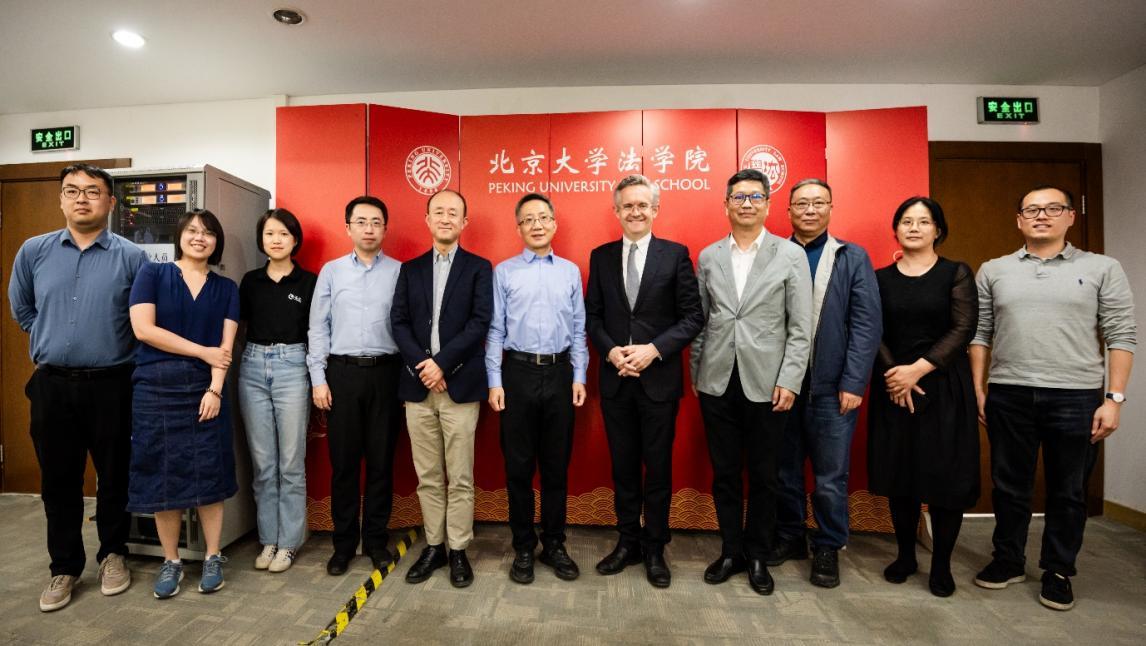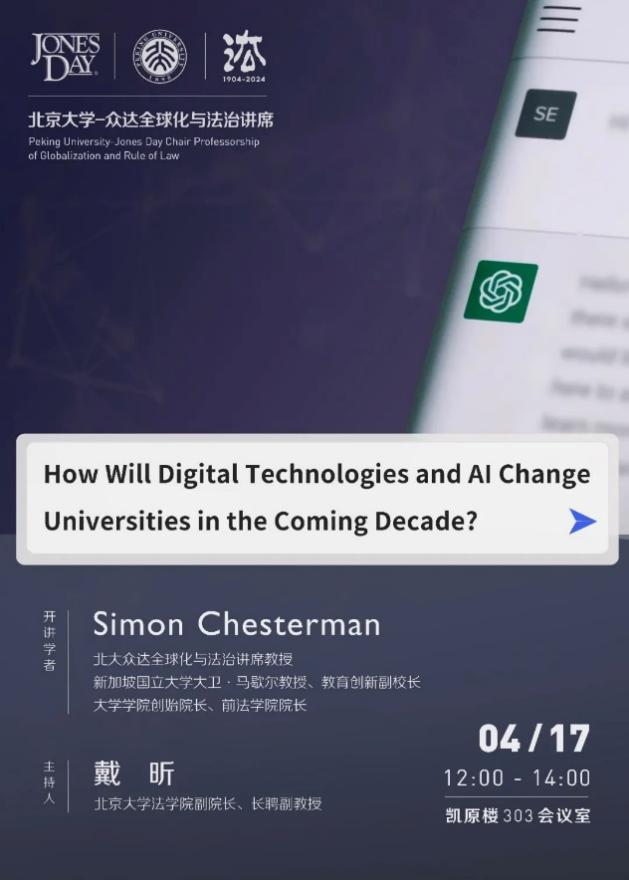Simon Chesterman: How Will Digital Technologies and Al Change Universities in the Coming Decade?
Date:2024-12-03

On 17 April 2024, Chair Professor of Globalization and Rule of Law at Peking University, Professor of National University of Singapore David Marshall and Simon Chesterman, Vice Provost (Educational Innovation) at the National University of Singapore, Founding Dean of NUS University College, and former Dean of the Faculty of Law, gave a lecture on "How Will Digital Technologies and Al Change Universities in the Coming Decade?" The lecture was hosted by Prof. Dai Xin, Vice Dean of Peking University law School, and was enthusiastically attended by students and faculty.

Prof. Chesterman's lecture was mainly focused on the change of the purposes of university education, the opportunities and challenges brought by AI to university education, and the impact of AI on university research and management.
The following presents the core points of the lecture as an edited transcript.
Simon Chesterman:
I. Change in the Purposes of University Education
Globally, universities typically have purposes such as teaching, research, innovation, and business. For a knowledge economy society, the rise of generative artificial intelligence (AI) technologies will not eliminate work, but will reduce the total demand for human labor at work. With the change in the technological background, the purposes of universities need to be re-examined.
Historically, Aristotle believed that the purpose of education was to fill students in on knowledge. This vision of the university, based on knowledge sharing, is no longer generally accepted. The information and knowledge on the Internet and other media may have far surpassed the university campus. Modern universities place more emphasis on the teaching of critical thinking, just as a law school education does not aim to teach all about the law, but to develop students' skills to analyze legal issues in the future. But, with the rise of generative AI, such skills based on legal analysis have been partly replaced by AI. Universities may still need to cultivate such skills, but they need to acknowledge that their importance may be declining.
Universities should pay more attention to the development of students' soft skills, especially interpersonal communication, leadership, and so on, which AI cannot currently replace. For example, the National University of Singapore will require students to complete a cross-disciplinary project, in which students need to learn how to work with people from different backgrounds. Medical schools may do better than law schools in this regard, because medical students are better able to recognize that they need to work in teams.
II. Opportunities and Challenges Brought by AI to University Education
Although AI poses challenges to university education, AI can be used to increase the frequency of student-teacher communication and to give students more effective feedback. First, AI can reduce the administrative work that teachers have to do, so that teachers can have more time to communicate with students. Second, AI itself can be used to tailor education, giving feedback directly to student submissions.
According to a report by Boston Consulting Group (BCG), AI assistance can enable the capabilities of the average personnel to be enhanced quickly. Given this AI-assisted effect, employers may be less inclined to pay top graduates when they can hire average staff at low cost, a challenge for elite universities such as Peking University. When I spoke to colleagues at a university in Australia, the challenge they face is not just to compete with the top universities, but to compete with the idea that education is futile – if the pay is similar after four years, why don't students just work? In the era of AI, this problem became even more acute.
AI is also affecting how universities are assessed. Current AI may not be able to produce the best answers, but it can produce a passable text. This makes grading students difficult, as there are situations in which it is difficult to see if a student is using generative AI. Some people suggest that we should return to a purely paper-and-pencil exam, but I don't agree with this view. Perhaps we should look at the way calculators are handled, and their use is gradually deregulated as education progresses.
The Impact of AI on University Research and Management
The source of academic research in the West is gradually shifting from non-profit institutions such as universities to for-profit institutions, and the field of AI may share this process. As we have seen, the technology at the cutting edge of generative AI is not produced in universities, but in large AI companies. AI may also interfere with human innovation. With technologies such as AI, humans may stop thinking hard about some questions. We have already seen published articles copy and paste content directly from AI, suggesting that academics may not even review their own work.
Academics often join universities for research or teaching purposes, and few start out wanting to do administrative work. But administrative work is very important to universities. AI can be used to reduce the cost of administrative work in universities. Rather than defining what administrative work AI can replace, consider what it cannot replace – hard to outsource, social interaction, and highly confrontational work such as construction, which may not be handled by AI at present. Beyond this, AI can provide a good complement to administrative work.
IV. Conclusion
Although AI poses many challenges to university education, I believe that universities need to actively embrace AI. To address the challenges posed by AI, universities do not need to change their existing policies significantly, only to adjust them at the margin. At the same time, teachers and students should be encouraged to try AI technology, and the current educational model should be gradually improved.
V. Questions and Answers
Question 1:
Is it possible that AI technology will lead to the complete replacement of universities?
Simon Chesterman:
AI technology may pose challenges to universities, but it will not replace all universities. With the development of AI technology, universities will need to compete with more subjects in student employment, but some elite universities may avoid competition because of their independent social status, and students may apply to such universities because they are members of a certain social group.
Question 2:
Will allowing students to use generative AI to write make it impossible for students to develop their writing skills?
Simon Chesterman:
The use of generative AI may prevent students from developing their writing skills, which is why international bodies such as UNESCO have advocated banning the use of generative AI for minors under the age of 13. At the same time, we should also recognize that using generative AI may also help to produce better work, and that it is a question of how much it is used and how it is used.
Question 3:
What can universities develop that AI cannot develop?
Simon Chesterman:
Probably the most important is to cultivate curiosity in students. A law school education should prepare students to be curious about legal issues, rather than simply analyze the law.
Introductory Scholar Curriculum Vitae:
Simon Chesterman is David Marshall Prof. and Vice Provost for Educational Innovation at the National University of Singapore, as well as founding Dean of University College London and former Dean of Faculty of School, National University of Singapore. He is Senior Director of AI Governance for Singapore's National AI Core project and Editor of Asian JournalofInternational Law. He was educated in Melbourne, Beijing, Amsterdam and Oxford, and has taught at the University of Melbourne, the University of Oxford, the University of Southampton, Columbia University and Sciences Po. He was Global Prof. and Director of the Singapore Program at New York University School of Law from 2006 to 2011. Previously, he was also Senior Fellow at the International Peace Institute and Director of United Nations Relations at New York Office of the International Crisis Group. He has also worked for United Nations Office for the Coordination of Humanitarian Affairs in the former Yugoslavia and as an intern at the International Criminal Tribunal for Rwanda.
Prof. Chesterman is the author and co-author of more than 20 books, including We, the Robots? Regulating Artificial Intelligence and the Limits of the Law (translated into Chinese as 《我们,机器人?人工智能监管及其法律局限》, already published in 2024). A recognized authority on international law, his work has broken new ground in the study of the concept of public power – covering the rules and institutions of global governance, nation-building and post-conflict reconstruction, the changing role of intelligence agencies, and the new role of artificial intelligence and big data. He writes extensively on legal education and higher education, and is the author of five novels.
Translated by: Zeng Zhu
Edited by: Guo Zhongqi



